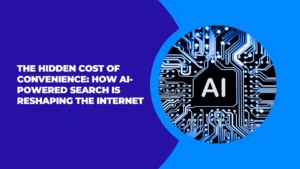Physical Address
304 North Cardinal St.
Dorchester Center, MA 02124
Physical Address
304 North Cardinal St.
Dorchester Center, MA 02124

The internet is undergoing a quiet but powerful shift. AI-driven search tools, like ChatGPT, Perplexity, and Google’s experimental SGE, are changing how people find and interact with information. Instead of clicking through to different websites, users are increasingly getting answers in a neat package, no extra steps required.
That convenience comes at a cost. It disrupts how traffic flows online, how creators get discovered, and how the web’s information economy functions.
For years, search engines operated like directories. Users entered a query, scanned the links, and visited websites to dig deeper. That process gave creators a fair shot at visibility and rewarded quality work. Now, AI is collapsing that experience into a single response box.
Instead of being directed to primary sources, users receive an answer that blends together bits from countless sites. There’s no need to leave the page. Google’s SGE, still in testing, does something similar, giving users a summary before they’ve even seen a list of links.
The effect on web traffic is already showing. Creators, especially smaller publishers, are seeing fewer clicks despite maintaining strong rankings. That loss isn’t just about numbers; it’s about reach, opportunity, and long-term sustainability.
The web runs on links. They help users navigate, help search engines assess authority, and help creators grow. In SEO, links aren’t just technical, they’re currency. They reflect trust, relevance, and human endorsement.
But when AI provides a complete answer up front, users skip the journey. They don’t follow the links, and they don’t encounter new voices or unfamiliar sites. Even if an AI assistant references sources, it often does so vaguely, sometimes without naming the origin or offering a clickable path back.
For content creators, that’s a problem. If fewer people link to your site, your domain authority drops. If fewer users visit your pages, your revenue and influence shrink. The feedback loop breaks, and the incentive to create thoughtful, accurate, or original work weakens.
The long-term risk? A shallower, less diverse internet. One where content exists mainly to feed language models, not to serve or inform actual readers.
It’s not just SEO pros who are affected. Small business owners, educators, nonprofit organizers, and independent writers are all part of a digital ecosystem that relies on search-based discovery. Their visibility is slipping, often without them realizing why.
AI-generated answers don’t come from nowhere. They’re built on the work of others: journalists, bloggers, researchers, educators, and business owners. But in most cases, users don’t see those names. They just see a paragraph that “feels” authoritative.
This raises a fundamental issue around credit. If you write a detailed, well-researched post that gets paraphrased by an AI, your voice disappears. Your style, your nuance, your perspective, all flattened into generic output.
And because AI tools don’t always provide proper sourcing, many readers have no idea where the information initially came from. In that system, creators lose visibility and credibility. There’s no handshake between source and reader, no relationship formed, no brand built.
Worse still, the people most affected by this are often the ones without institutional backing: independent writers, small business owners, and niche experts who rely on digital visibility to grow.
Some creators aren’t waiting around for solutions. They’re adjusting. Instead of chasing broad traffic, they’re leaning into community, loyalty, and formats that AI can’t easily replicate.
E-commerce brands are a good example. Faced with the declining value of traditional search, many are investing in e-commerce link building strategies that prioritize relevance and authority in specific niches. The goal isn’t just volume; it’s about earning meaningful connections that strengthen visibility and rankings in a targeted way.
Others are shifting focus toward content formats AI doesn’t handle well: video explainers, interactive tools, real-time updates, and personality-driven newsletters. These formats aren’t just harder to scrape; they build a direct bond with the audience.
Success in the current landscape means more than climbing search rankings. It means offering experiences AI can’t replicate – humor, authenticity, unpredictability. Content creators are leaning into their personalities and values, knowing that what sets them apart isn’t just information but perspective.
One additional reason creators are doubling down on original content is trust. Users are growing more aware that AI-generated answers can sound confident while being flat-out wrong. Creators who publish thoughtful, well-researched work and back it up with transparency have a chance to stand out in a sea of sameness.
AI-powered search isn’t going away. It solves problems quickly and helps surface information that might otherwise stay buried. But we shouldn’t let its speed and convenience come at the cost of the people who make the internet worth visiting.
If creators stop getting credit, they’ll stop contributing. If traffic dries up, the digital voices that once made the internet diverse and dynamic will fade. The web will become a passive source for extraction, not a space for discovery and exchange.
To keep the internet human and worth exploring, we need to rethink how value flows. That means supporting platforms and policies that honor attribution, reward original work, and give people reasons to keep publishing. A healthier digital future depends on it.